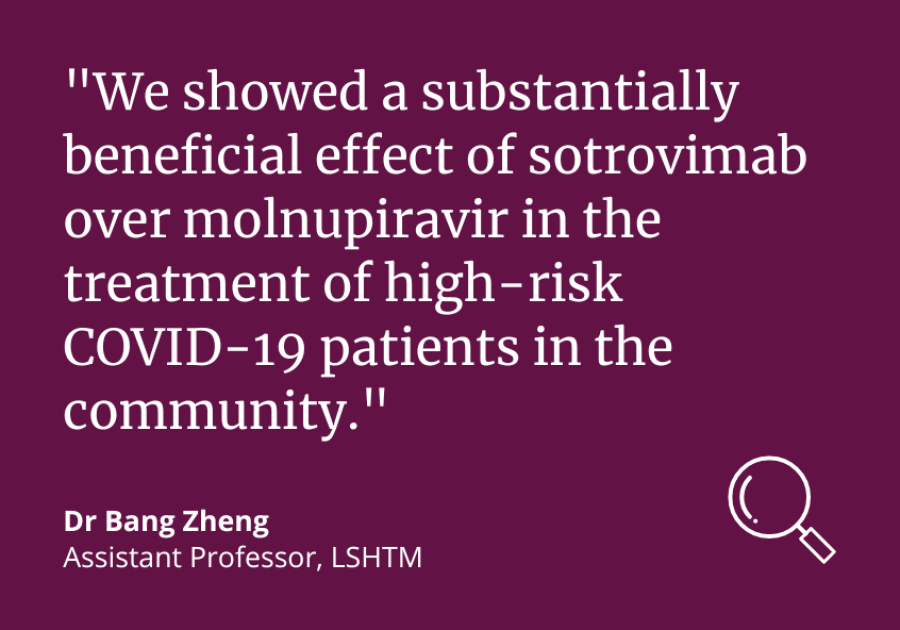'Real world' evidence on effectiveness of COVID-19 treatments to inform care
17 November 2022 London School of Hygiene & Tropical Medicine London School of Hygiene & Tropical Medicine https://lshtm.ac.uk/themes/custom/lshtm/images/lshtm-logo-black.png
New research by a team including scientists from the London School of Hygiene & Tropical Medicine (LSHTM) provides up to date evidence on the comparative effectiveness of two currently licensed treatments for COVID-19 under ‘real world’ conditions.
The study, published in The BMJ, was carried out in England between December 2021 and February 2022 and involved researchers used hospital records and death certificates for high-risk adults with COVID-19 (average age 52) to compare the effectiveness of the antibody treatment sotrovimab with the antiviral drug molnupiravir.
The researchers found that those who received sotrovimab were at a substantially lower (46%) risk of severe COVID-19 outcomes than those receiving molnupiravir, within 28 days of treatment.
Results were consistent when restricted to fully vaccinated people and also after further analysis of patients treated between February and May 2022 when the BA.2 omicron variant of COVID-19 was dominant in England, suggesting that they are relevant to current clinical care.
There is currently ongoing discussion about the effectiveness of different antibody and antiviral treatments for COVID-19 with recent World Health Organisation and National Institute for Health and Care Excellence (NICE) guidance considering the use of sotrovimab.
Dr Bang Zheng, co-author from LSHTM, said: “This real-world cohort study showed a substantially beneficial effect of sotrovimab over molnupiravir in the treatment of high-risk COVID-19 patients in the community, and provides timely evidence for clinical practice and healthcare planning during the Omicron era.”
Dr Laurie Tomlinson, co-author from LSHTM, said: “This study shows the huge potential public health benefit of access to linked data on new treatments. This could enable near real-time monitoring of drug effects, as we have been able to do here for COVID-19 treatments.”
According to the researchers their analysis also supports the conclusion that sotrovimab remains beneficial in fully vaccinated patients, which now represent the majority of the COVID-19 patient population in many settings.
The study’s limitations include that some misclassification about cause of death or hospital admission may have occurred, and the researchers can’t rule out the possibility that differences in initial severity of covid-19 or other unmeasured factors between treatment groups may have influenced their result.
Publication
Zheng et al, Comparative effectiveness of sotrovimab and molnupiravir for prevention of severe covid-19 outcomes in patients in the community: observational cohort study with the OpenSAFELY platform. BMJ. doi: 10.1136/ bmj-2022-071932
Notes
This article was based on an original story by The BMJ.
LSHTM's short courses provide opportunities to study specialised topics across a broad range of public and global health fields. From AMR to vaccines, travel medicine to clinical trials, and modelling to malaria, refresh your skills and join one of our short courses today.